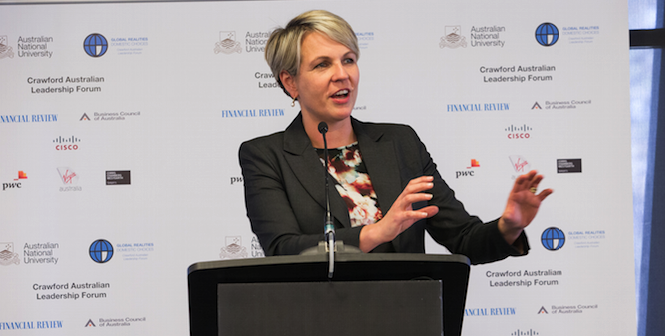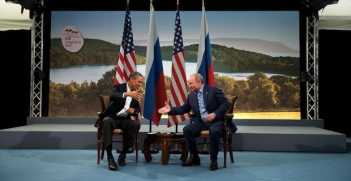Problems Without Passports

Kofi Annan talked about “problems without passports”: problems which are transnational, even global. They are the problems which threaten our peace, our prosperity, the health of our people and our planet. And they are problems which require the co-operation of nations to solve. Indeed, we can only solve them if we work domestically, regionally and globally.
In facing our problems without passports, we have a threefold task:
- Each nation must take necessary action within its borders. The intensifying effect on global extremism of Iraq and Syria’s inability to deal with Da’esh is an example of failure in one state having an effect on all.
- Regional partners must act effectively together. There was a time when Solomon Islands appeared to be in danger of becoming a failed state. The countries of the Pacific Island Forum responded with the Regional Assistance Mission to Solomon Islands (RAMSI). With participation from every Pacific Island Forum country, and led by Australia, over 12 years RAMSI has seen law and order restored, national institutions rebuilt and Solomon Islands economy reformed.
- The global community must work together. Smallpox, which killed hundreds of millions of people in the 20th century alone, was completely eradicated by the World Health Organization’s Smallpox Eradication Programme, in a patient and determined 14 year international campaign.
Climate Change as an Example
There are many examples of problems without passports: health epidemics, the current displacement of a record 60 million people world-wide by war and conflict, natural disasters and economic crises like the Global Financial Crisis. Today, I’m going to focus on one in particular: climate change. Climate change presents undeniable risks to our own country, our neighbours and to the world.
In Australia, both extreme fire weather and extreme sea-level events have increased. The $5 billion Great Barrier Reef tourism industry has already felt the impacts of coral bleaching and increased frequency and severity of storms and cyclones. From 2020 onwards, the predicted increase in drought frequency is estimated to cost $7.3 billion annually, reducing GDP by 1 percent per year. In the Pacific, all of the land area of the Marshall Islands and Tuvalu, and 97 percent of the land area of Kiribati, is less than five metres above sea level.
Tuvalu Prime Minister Enele Sopoaga said last year that climate change was “like a weapon of mass destruction”. In the broader Asian region, countries are experiencing declining food security, water shortages, increased prevalence and geographical reach of disease and more extreme weather events including floods and cyclones. The UN estimates that without action, worldwide economic losses from natural disasters will double by 2030 – to $200 billion each year.
Estimates for the number of potential “climate refugees” worldwide range upward from 75 million. That is potentially twice as many as the record high number of people displaced today. If we are seeing the world struggle with mass movements of people now, imagine what the world will look like when that movement is doubled.
Good Foreign Policy Starts at Home
Just as the consequences of these complex challenges cross countries, regions, and the global community, so do the solutions.
We can’t ask others to do what we’re not prepared to do ourselves. As Dr Michael Fullilove argued in one of his recent Boyer Lectures, talking specifically about climate change, good foreign policy begins at home. We can’t expect our relationships with other countries to thrive if we are complacent about a threat that affects us all. This is as true of climate change as it is of something like Ebola.
A foreign policy approach which looks beyond the next budget or the next election and plans for the next decade and the next century must see credible action on climate change in Australia as important to our global relationships and future security.
We need to do better domestically. Our government has repealed the carbon price. It has tried to shut down the Clean Energy Finance Corporation, and this year tried to ban it from investing in solar and wind. It has tried to axe the Australian Renewable Energy Agency and did abolish the Climate Commission. And it has tried to abandon the renewable energy target.
Australia’s largest energy and emissions market analyst, Reputex, has confirmed under the Australian Government’s current policy carbon pollution levels from Australia’s biggest polluters will increase by 20 per cent by 2030. And for the hard-nosed realists in the room, the cost of shirking our national responsibility can be measured in Australian dollars and jobs. Last year investment in large-scale renewables dropped by 88 per cent in Australia while it grew by 16 per cent around the world. Since the last election, the ABS has found that about 15 per cent of jobs in the renewables sector have vanished.
Labor’s recent announcement of that 50 percent of our electricity will be generated by renewable energy target by 2030 is proof of our determination to seize back that opportunity, and meet our national responsibility along the way.
Dr Fullilove also points to the missed opportunities for Australia by failing to act as a leader on climate change, both regionally and globally: “A generation ago – perhaps even a decade ago – Australia might have led the world in finding a market solution to the problem of reducing emissions. It was the kind of thing we did well,” he said.
Just as Australia must act on climate change at home to credibly call for action abroad, we must act in our region to credibly call for action globally.
The Cost of Our Current Failure to Act Credibly Domestically
In the Pacific, Australia’s responsibility could not be more pronounced. We are the greatest per capita emitter in the world and Pacific Island countries are, as the UN Secretary-General Ban Ki-moon said earlier this month, on the front line of climate change.
Just as our responsibilities at the regional scale are great, so are our opportunities: over $2.5 trillion is expected to be invested in renewables in the Asia Pacific region up to 2030. Australia has a strong record of engaging with our region, including with institutions like ASEAN. We have the patience and the capacity to drive complex policy solutions like the Cambodian peace process.
We have the clear avenue to be part of a constructive dialogue through the Pacific Islands Forum. The Pacific Islands Forum Secretariat is engaged in multi-stakeholder efforts to harness available climate change financial aid in effective and informed ways. Aid effectiveness and capacity building is an area where Australia excels. We should make more of this opportunity for leadership, rather than cracking jokes about the desperate plight of our neighbours.
After Minister for Immigration and Border Protection Peter Dutton was caught on microphone laughing about homes in the Pacific Islands threatened with inundation, Kiribati President Anote Tong said, “It shows a sense of moral irresponsibility quite unbecoming of leadership in any capacity…I find that extremely sad, extremely disappointing that we are making jokes about a very serious issue.” He said of Australia and New Zealand: “We expect them as bigger brothers, not bad brothers, to support us on this one because our future depends on it.”
The reputational damage Australia suffers from being viewed as a “moral[ly] irresponsible” “bad brother” hurts more than simply our ability to effectively advocate for and shape a response to climate change. It limits our influence in regional and multilateral institutions where we have previously been able to play a strong role advancing our national interest of regional peace and stability. And the more recalcitrant we are and we’re seen to be, the more difficulty we’ll have in the future negotiating regional and global changes as economic, political and military centres of gravity shift.
Of course, a problem like climate change demands even more than regional cooperation. It’s a global problem that will only be met effectively by global action.
The Global Response
We know already that thoughtful, patient global responses to complex problems can succeed beyond our most optimistic imaginings. World Health Organization campaigns have eliminated smallpox and are on the brink of eliminating polio. Just think about that for a minute. Smallpox, that killed hundreds of millions of people in the twentieth century alone, is gone. Polio, which stalked Australia so recently that our current Ambassador to the United States, and the next Australian Institute of International Affairs National President, Kim Beazley, still has a vivid memory of waking up one morning unable to move, has been eradicated from the western world and is on the brink of being eradicated world-wide. The number of cases worldwide has dropped from 350,000 cases in 125 countries in 1988 to just 359 cases in 2014.
An AIDS-free generation is in sight.
The Millennium Development goals have lifted more than 1 billion people out of extreme poverty since 1990.
We have already seen the global community come together on the question of climate change:
- In 1988 the Intergovernmental Panel on Climate Change was established.
- In 1997, the Kyoto Protocol was adopted, the world’s first greenhouse gas emissions reduction treaty.
- The first official act of the Rudd Government in 2007 was to ratify Kyoto.
Today, partly driven by global negotiations, emissions trading policies are in place for around 1 billion people and more than 40 percent of the world’s economy. When China’s recently announced national emissions trading scheme starts in 2017, around 2 billion people and 40 percent of the world’s carbon emissions will be covered.
The 2015 United Nations Climate Change Conference is next month. Australia has a proud history of shaping international agreements, from the founding of the UN onwards. In Paris, Australia has the opportunity to push for strong and credible action on climate change.
And we should. But sadly, our influence may be limited. Right now, we’re seen as a global laggard on climate change. In fact, a report by the Africa Progress Panel described Australia as a “free-rider” on global efforts on climate change. The world is perplexed that as the international community moves forwards, Australia is going backwards. The ETS, which the data shows was working, was dismantled by this government. Emissions from our electricity sector have subsequently gone up.
The Larger Lessons from the Climate Change Case Study
“Problems without passports” continue to challenge us and climate change is just one of them. Yet it underscores two points which apply to Australian foreign policy more broadly.
Firstly, being part of regional and global communities involves both opportunities and responsibilities. But if you don’t meet the responsibilities, you miss the opportunities. Because every community is a network of long-term relationships, whose foundation is reciprocity and respect. Although the questions change, we return to the same relationships, the same regional communities and the same multilateral institutions time and again. Our early diplomatic approach with China in the 1970s opened the door to a relationship which has developed and strengthened. The strategic partnership between Australia and China negotiated by the Gillard Government is one example. CHAFTA is another. We’ve seen South Korea go from being a recipient of Australian aid to our 4th largest trading partner.
When Labor was last in government, we launched the Australia in the Asian Century White Paper which made sure our changing regional dynamics were considered in every aspect of government decision-making and allowed us to seize those regional opportunities. Labor matched that strategic thinking with concrete investment in our relationships with the global community, by doubling our aid program and expanding our diplomatic footprint. And we were grateful to be supported by many of our neighbours in our bid to join the UN Security Council.
The second lesson is that, increasingly, policy-making at the national, regional and global levels cannot be separated from one another. To take just one example: Labor’s ambition for a growing Australian economy has been expressed in recent years both by our strong support for the Asian Infrastructure Investment Bank, and the elevation of the G20 during the Global Financial Crisis. We understand these engagements are complementary, not contradictory.
Conclusion
I began by quoting Kofi Annan, former Secretary General of the United Nations on “problems without passports”. Just last month I was in New York when the world came together to set a new agenda for addressing some of the most persistent of these problems. 193 nations adopted the Sustainable Development Goals. The current Secretary General, Ban Ki Moon said these Global Goals compel nations to “look beyond national boundaries and short-term interests and act in solidarity for the long-term.”
Meeting these Global Goals will take action at home. First we should be prepared to measure our success against these global targets. And Australia must meet our aid obligations. In our region, Australia has a responsibility by capacity and proximity to take a leadership role. And, working with the international community in multilateral partnerships, our role is also global. We can’t step up the scale of our ambition, if we start from shaky domestic or regional foundations. The Global Goals, like any other international challenge, can only be met through coordinated efforts on all these levels – domestic, regional and global.
The Hon Tanya Plibersek MP is Shadow Minister for Foreign Affairs and International Development. This article is adapted from an address to the Australian Institute of International Affairs’ National Conference at Hotel Realm, Canberra on Monday 19 October 2015. This article can be republished with attribution under a Creative Commons Licence.





